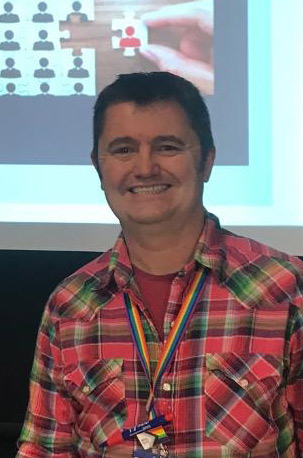
Dr Michael Blackmore knew from an early age he wanted to be a doctor. Growing up on a council estate, he was 10 years old when the GP visited his younger brother in the middle of the night to treat a severe asthma attack. It stuck with him.

Yet while he was clever and had ambition, he didn’t have the grades – at least initially. After a degree in genetics, then a Masters, he got a place to study medicine in Aberdeen on his fourth attempt. “I saw other people doing medicine, and thought, I can do that. It's caused a few issues along the way, but it's still the best career that I could have dreamt of.”
Immersing himself in his studies – after the time already spent at university, the first couple of years of medical school were pretty easy – he also threw himself into the social scene, drinking heavily and dabbling in recreational drugs. “I was a functioning addict, partying very hard at weekends, having the mid-week come down, trying lots of different antidepressants,” he explains.
By the time he was a junior doctor, his substance use had escalated driven by the pressures of work, perfectionism and self-doubt. After a knee injury, he found himself in a cycle of prolonged painkiller use with access to drugs in A&E where he was working. “I used drugs to try and dampen down those feelings of inadequacy,” he says.
As his tolerance and drug use increased, his struggles grew. Feeling sick and exhausted, he paid for therapy but it didn’t help. “So I wrote the goodbye cruel world letters, and luckily messed it up. I realised I had four choices - end up in an institution, end up in a police cell, end up dead, or I could do something different.”
By this point working as a GP doing out of hours shifts in the north of England, he self-referred to the early form of NHS Practitioner Health where he was told ‘you know you're going to die, you've really got to self-refer to the GMC’.
Terrifying a prospect as that was, he describes the GMC’s response as “very fair” putting boundaries in place that saved his life. He entered a 12-week rehabilitation programme and realised he had been lying to himself as well as others.
Unable to immediately return to working in general practice, he completed the RCGP drug misuse course and began working in addiction recovery centres. His experience meant he could provide a level of empathy he had not always been afforded by those around him.

Eventually doors began to reopen, and he slowly rebuilt his career. A GP practice in Edinburgh took a chance on him, offering an unpaid honorary position to help him reintegrate into the profession. When a unique role opened up in Forth Valley, combining GP work with community addiction services, prison medicine, and elderly rehabilitation, he seized the opportunity.
Six years ago, he became a partner in the practice. He now has an LMC leadership role working on GP recruitment and retention strategies as well as quality improvement. He is also chair of the RCGP West Scotland Faculty.
“All these opportunities just keep on opening up. All I've got to do is just stay in recovery one day at a time. Put in the work, let go of the results and good stuff happens.”
He works hard to reduce the stigma associated with addiction by sharing his story with medical students, junior doctors, and policymakers. “Addiction is not a moral failing but a disease—one that can be managed with the right support,” he stresses.
He often recognises the same struggles in his patients. “I try and challenge them, name what I'm seeing, and empathise. I say to them, you've probably got low self esteem, low self confidence. You feel judged and criticised, but you're your biggest judge and critic. You overthink things, over analyse, catastrophise, have a very busy head, and using alcohol or drugs calms it down for a little bit, but then it comes back with a vengeance.”
Whether presenting at the RCGP conference or advising medical students on resilience, his message remains clear: recovery is possible. “I think if you go to medical school, you're blinkered into thinking bad stuff won't happen to you but we're all still human.”
Now almost 16 years sober, he says he has peace of mind, most of the time. “I didn't ever think I was good enough in the past, and now I'm quite content with where life has taken me.”
This contentment includes spending time with his two children, aged 12 and 15, whether at a Taylor Swift concert or watching Liverpool play at Anfield. “I’m living a life beyond my wildest dreams.”
Thank you for your feedback. Your response will help improve this page.
